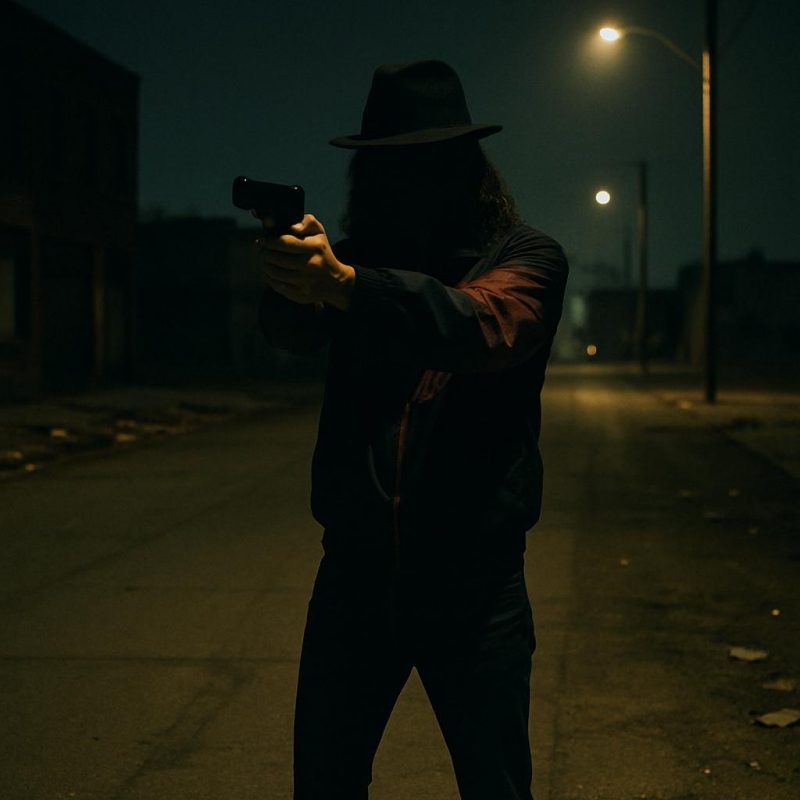Moonshot [Part 8] – The Namer’s House
Cryptocurrency is Deek’s last chance to succeed in life, and he will not stop, no matter what.
Previous Chapters: Part 1 | Part 2 | Part 3 | Part 4 | Part 5 | Part 6 | Part 7
“Were the world the possession of a single man, it would not make him rich … because it is passing away.”
– Rabiah Al-Adawiyyah
 Deek dreamed that he was walking through the Al-Hajarah desert of his native Iraq. It was a forbidding land, with a mosaic of stony plains, wadis, ridges, and gullies. He’d heard a rumor that the the Half-Buried Ziggurat of Šar-Ḫadīdu, part of the ancient kingdom of Ur, held a huge hidden cache of silver drachmas. He wanted that money, and would stop at nothing to get it.
Deek dreamed that he was walking through the Al-Hajarah desert of his native Iraq. It was a forbidding land, with a mosaic of stony plains, wadis, ridges, and gullies. He’d heard a rumor that the the Half-Buried Ziggurat of Šar-Ḫadīdu, part of the ancient kingdom of Ur, held a huge hidden cache of silver drachmas. He wanted that money, and would stop at nothing to get it.
He had drunk the last of his water and his throat was parched, but he must have that treasure.
As he trudged through the sweltering landscape, he passed a knot of Bādū shepherds, tending their sheep in the arid washlands. They called to him, offering to share water and flatbread with a weary traveler, but Deek did not trust them. What if they only wanted the secret of the treasure? Licking his cracked lips, he walked on.
He dropped behind a stone to hide from a group of shadowy men driving battered 4×4s and carrying rifles.
He encountered a woman praying on a rug in the shadow of a crumbling watchtower. Her abaya was drawn across her face, but she seemed young. He was about to pass her by when she ended the prayer and spoke his name.
“Deek Saghir, son of my sons.”
Deek cleared his throat. “Yes?”
“I am Rabiah Al-Adawiyyah.”
Deek knew her. She was an Iraqi poet and ascetic who had lived in the 8th century. She was famous for her deep piety. Deek cast his gaze at the ground so as not to offend the holy woman’s modesty.
“My father,” he said, “often told me that you were our ancestor. But our village shaykh said that he was wrong, that you never married, and spent your life in worship.”
“Child Deek,” she replied. “Who are you?”
Deek was confused. If she knew his name, why was she asking?
“I’m looking for a hidden treasure of silver,” he explained. “It’s near here.”
“I did not ask what you are doing. I asked, ‘who are you?’”
Deek’s eyebrows knitted together. “This is me. I am determined to be rich. It’s my destiny.”
“If that is all you are, then you are nothing.” Rabiah turned away and began to recite the Quran, her soft voice carrying clearly across the desert sand.
Deek walked on. The sun was high in the sky and beginning to burn. His waterskin was bone-dry, and each breath tasted like dust. He wasn’t going to make it. It had been folly to come out here. He was wounded by Shaykha Rabiah’s words. What did she mean that he was nothing? He had struggled mightily to find this treasure, and was still struggling. He was determined and focused. That was more than 99% of people could say.
His legs gave out. With the words, “Who are you?” echoing in his mind, he fell on the hot sand and lay prostrate.
Clear MindDeek’s face was hot. He waved a hand beside his cheek, mumbling, “I’m me, that’s all. I’m just me. That’s something, not nothing.” He opened his eyes to find himself in a small bed that just barely fit him, covered with a geometric-patterned quilt. The sun beamed through the window, shining on his face.
He didn’t like the way Rabiah Al-Adawiyyah had turned away from him at the end. Was she disappointed in him? She was a saint, and he was an ordinary man. What did she want from him?
Wait… that wasn’t real. That was a dream. He blinked several times, trying to understand where he was. Sitting up, he felt a twinge of pain in his ribs. He was dressed in blue flannel pajamas that he did not recognize. Lifting the shirt, he saw that his entire torso was bandaged.
He remembered. The kidnapping, the terrible beating they’d given him, and Zaid Karim blazing in like the angel of death, killing the kidnappers and saving him. The pain in his ribs was not nearly as bad as it had been last night. He opened and closed his mouth. His jaw was sore, but worked just fine. He touched his nose and found it also bandaged.
He was not worried. In fact, now that the morning brain fog had cleared, his mind was sharp and clear. He didn’t feel much of anything, emotionally. Instead, he was like a machine that had been designed to observe, calculate, and strategize. He still remembered Rabiah Al-Adawiyyah’s probing questions and comments. He understood that she expected more from him spiritually. But at the moment, this did not disturb him.
The room in which he sat was made of white painted brick. On the walls were shelves that held colorful woven baskets, a stone axe and obsidian knife, and other objects that might have been tools or weapons; as well as abalone shells, something that looked like a rattle, and a feathered headdress mounted on the wall. It was as if he was in a Native American museum.
His two suitcases stood in one corner. Zaid must have gone back to the Moon Walk motel to retrieve them.
He was desperately thirsty. Rising slowly, he put on a pair of slippers he found beside the bed, went through a door and found himself in the bathroom. The mirror above the sink showed a face that did not look as bad as he expected. His eyes were slightly bruised and swollen, and his nose was bandaged, but on the whole he felt much better than he should, based on his memory of what the thugs had done to him.
The Namer’s HouseThe small sink operated with a foot pedal, of all things. Pumping the pedal, Deek drank greedily and washed up, then went to find someone to talk to.
 He discovered that he was alone in the small house. There was another bedroom, decorated similarly to his own. The modest living room, sparsely furnished with a sofa, table, and chairs all hewn from natural oak, also had shelves on the walls, but these held glass jars and bottles that were filled with herbs, spices, and colored liquids. There was no television, phone, or any electronics that Deek could see. Not even a refrigerator in the little kitchen, though there was an ancient-looking oven and stove. There were unlit candles everywhere, most of them in votive glasses.
He discovered that he was alone in the small house. There was another bedroom, decorated similarly to his own. The modest living room, sparsely furnished with a sofa, table, and chairs all hewn from natural oak, also had shelves on the walls, but these held glass jars and bottles that were filled with herbs, spices, and colored liquids. There was no television, phone, or any electronics that Deek could see. Not even a refrigerator in the little kitchen, though there was an ancient-looking oven and stove. There were unlit candles everywhere, most of them in votive glasses.
His phone sat on a little table in the kitchen, beside a candle, a box of matches, and an ashtray. In addition,n there was an assortment of foodstuffs, including a loaf of bread, a few tins of sardines, a small block of cheese wrapped in cloth, jars of peanut butter and jelly, a basket of tomatoes, a bowl of oranges, and a bag of dry cat food.
Beneath the phone was a note:
“Akhi Deek: You are in the Namer’s house. It’s a safe place where you can recuperate. She treated your wounds and gave you healing medicine, so you should feel better. She’s gone to the coast for a day, but help yourself to the food. You can use your phone, but don’t make any calls for now, and remember there’s no electricity. Do NOT talk about last night’s events to anyone! I need to get to the bottom of what happened. I’ll see you later tonight, inshaAllah. Burn this note. – Zaid.”
Wealth for Wealth’s SakeDeek read the note over again, then crumpled it, lit it on fire with a match, and set it in the ashtray to burn. No electricity? Sinks with foot pumps? Shelves with axes and potions? He couldn’t tell if he was in a Western movie, a Grimm’s fairy tale, or a spy thriller. In any case, he was alive, so alhamdulillah for that.
Compulsively, he turned on the phone. There were text messages and missed calls from his wife and both of his daughters, and voicemails from numbers he did not recognize. He would read and listen to them later.
He checked his crypto balance. The altcoin rally he’d been waiting for the last two years was in full swing. His portfolio was up to 90 million.
This was what Rania, Lubna, and others had not understood about crypto. It was extraordinarily volatile, but it was cyclical, and it was a waiting game. You had to have the knowledge to know what to buy, but after that, it was all about being patient and waiting for the next parabolic bull rally. Crypto bull cycles could be insanely profitable, to a degree unimaginable in any other asset class.
Deek had been through one such euphoric rally before – that was when he’d made the $200K – but he’d held the tokens too long and lost it all in the inevitable bear market collapse. After that, he’d waited three years for the next bull cycle, and it was finally here. His knowledge and patience had paid off. All he had to do was recognize when this monster run was peaking, and get out in time.
If he played his cards right, he could hit a net worth of half a billion dollars before this bull cycle ended. The thought was mind-boggling. He had no idea what he would do with the wealth he already possessed, let alone half a billion dollars. But it wasn’t about that anymore.
His friend Marco had multiple college degrees. He’d once told Deek that receiving the first diploma had been a thrill – as it was for everyone- but that after that, each successive degree meant less. For Marco, studying wasn’t about the degrees anymore, but the pursuit of knowledge for its own sake. It had occurred to Deek more than once that Marco, who was not Muslim, was following with great dedication Allah’s command to “Read!” – But was missing the second part: “In the Name of your Lord Who Created…”
The point was that Deek felt the same way about growing his cryptocurrency hoard. Now that he was at almost a hundred million, it was no longer about securing a better future for himself and his family, but about perfecting the investment process itself. Making the right choices, timing the market, seeing the numbers grow. Excellence and wealth for the sake of excellence and wealth.
As he thought this, he heard a distant echo of Rabiah Al-Adawiyyah’s voice saying, “If that is all you are, then you are nothing.” But he pushed it aside.
Urban Wasteland OasisThere was no lock on the front door. How was he supposed to be safe in a house with an unlocked door? He opened it and stepped outside to find himself looking at a garden in the middle of a wasteland. The house’s small front yard was gorgeous, filled with flowers and herbs. Bees buzzed resourcefully, and butterflies flitted from rose to bird of paradise to carnation. There was a narrow driveway, but no garage.
Beyond this house, however, the neighborhood consisted of crumbling homes with bare earth yards, junked cars, empty lots strewn with trash, a house that had burned to the ground, and an abandoned house that was boosted up on pillars of bricks for some reason.
What city was this? Was this even Fresno? He’d never seen anything like this in Fresno.
He went inside and explored further. There was a back door that exited off the kitchen.
Stepping out, he found himself in an earthly imitation of Paradise. The backyard was huge, many times larger than the house, and enclosed by a wooden fence. The entire space was filled with fruit trees and herbs, rows of vegetables, and bird feeders. Everywhere he looked, he saw birds hopping, darting, and feeding, including hummingbirds. There was a covered patio with chairs and a glass table, and several empty food bowls. As Deek stood there, four cats of various colors trotted up to him, meowing and rubbing against his legs. He retrieved the bag of cat food and filled their bowls, and watched them munch happily.

The Namer’s backyard
He considered. Based on the poverty-stricken neighborhood, the lack of a lock on the front door, and the herbs and potions in the house, he concluded that the Namer must be some sort of neighborhood medicine woman. She treated the people here, and they respected and protected her. Or perhaps they feared her. Or both.
Also, based on his own physical condition, which was better than he had any right to expect, and on his strangely clear state of mind, he deduced that the Namer had given him some sort of healing potion. The woman was clearly a genius. She could market these potions and make a fortune.
Money ManagementSpeaking of fortunes, it was time to manage his assets. He must not fail to make the most of this opportunity. First, he changed the settings on his Coinbase account, linking it to his own personal account instead of the joint account. Then he sold $5K worth of Solana and sent it to his bank account.
 Using Phantom, Solflare, Trust Wallet, and Coinbase wallet, he created multiple sub-wallets and began to distribute the assets. For each wallet he created, he wrote the secret phrase – a list of 12 or 24 random words – on an encrypted text file on his phone. Later, he would save the phrases on an encrypted thumb drive and store it in a safe deposit box.
Using Phantom, Solflare, Trust Wallet, and Coinbase wallet, he created multiple sub-wallets and began to distribute the assets. For each wallet he created, he wrote the secret phrase – a list of 12 or 24 random words – on an encrypted text file on his phone. Later, he would save the phrases on an encrypted thumb drive and store it in a safe deposit box.
He sold the five dozen or so nearly valueless meme coins that he still held, and began to invest in blue chip cryptos like Bitcoin, Ethereum, Solana, Avalanche, Cardano, and Chainlink. He also bought a number of large-cap utilities on the Solana chain, including DEXes (decentralized exchanges) like Orca and Raydium, a launchpad, a streaming audio service, and a few popular games. Lastly, he put about $10 million in more experimental tokens, not tiny microcaps this time, but mid-cap AI tokens similar to the Alpha101 that had made him a fortune.
When this was done, he did a search for asset management firms that specialized in crypto. There were many in the USA, including in San Francisco, and others in London, Switzerland, and Germany. Several in Singapore and Hong Kong, and three in the Caymans. He called all three of the Caymans firms and got voicemail each time. Apparently they didn’t work on Saturdays down there. Too busy relaxing at the beach. He left messages explaining that he had earned a lot of money in crypto and needed guidance.
For a long time, he lost himself in these tasks, as he always did with crypto. Cryptocurrency fascinated him, and he never grew bored of it. The cats lounged at his feet, and occasionally he reached out to pet one. At some point, he realized he was hungry. He went inside and made a sandwich of sardines and tomatoes of all things – not something he would normally choose. He had no craving for chips or sweets. What had the Namer done to him? She could seriously be rich if she wanted.
His body needed more rest, so he returned to bed and fell asleep almost immediately.
Shake the EarthZaid needed to confront Bandar Tzan’ani, but he wasn’t interested in assaulting the man’s fortified compound in south Fresno. Killing those three men yesterday had shaken him and left his soul as turbulent as a thunderstorm. He’d gone home, parked the car, and wept. They had not been the first men he’d killed, nor even the last since Panama. But taking a human life was an enormity that should quake the earth itself and make the heavens weep. It was not to be done and forgotten.
To make matters worse, he’d made no attempt to negotiate and delivered no warning. He’d cut the men down in cold blood. Tactically, it had been the sound choice. There really had been no other option, and one could say the men deserved it. Without a doubt, this had not been their first crime. Zaid wouldn’t be surprised if collectively, those three men had a river of blood on their hands.
But it didn’t matter. Who was he to say who deserved what? The experience left him feeling like an assassin.
Nevertheless, he had a job to do. He’d made some calls, and learned that Bandar had a certain ritual that he repeated every Saturday night. That was perfect, as it would allow Zaid to confront the man in a public setting, which would force them both to behave. Hopefully.
Zaid had two goals: one, he had to make it clear to Tzan’ani that Deek Saghir was off limits. Two, to take responsibility for the killing of Tzan’ani’s men. If the Yemeni king of liquor and dope was determined to pursue this conflict, then Zaid wanted to make himself the target of the man’s wrath, rather than Deek.
Saturday Night at the Movies It was Saturday night, and Bandar Tzan’ani settled into a middle seat at the River Park Regal cinema. He always reserved his seat in advance, and he always reserved the seats on either side and directly in front, to make sure that he had plenty of private space and an unobstructed view. His hulking bodyguard was seated in the row behind him and a few seats over. Bandar had a large bucket of popcorn, a soda, and a box of red liquorice. His wife would not let him eat such things, but in this theater he was king.
It was Saturday night, and Bandar Tzan’ani settled into a middle seat at the River Park Regal cinema. He always reserved his seat in advance, and he always reserved the seats on either side and directly in front, to make sure that he had plenty of private space and an unobstructed view. His hulking bodyguard was seated in the row behind him and a few seats over. Bandar had a large bucket of popcorn, a soda, and a box of red liquorice. His wife would not let him eat such things, but in this theater he was king.
The previews had just begun, and he was already smiling. He cherished these weekly movie excursions. In fact, he lived for them.
About a year ago, he’d begun experiencing pains in his abdomen. He had not gone to the doctor, as he was afraid of what they might say. He told himself it was stress. The only pleasure he had anymore was his Saturday night movie outing. He changed up the cinema regularly for security purposes, but he had to admit that the River Park Regency, with its huge screens and surrounding restaurants in the mall, got more attention than all the others.
Here at the movie house, he could forget the world for a solid three hours. And if it was an action movie or a western, so much the better.
Hollywood hardly ever made westerns anymore. Why was that? Bandar absolutely adored movies like Open Range, True Grit, Red Hill (though it was modern and Australian), Django Unchained (though not a true western), and above all, 3:10 To Yuma. Though, as for The Revenant, the director should be thrown off a high cliff for making that depressing abomination.
He’d thought about building a private cinema in his compound, but it wouldn’t be the same. He liked the excitement of seeing new releases, hearing people laugh or cheer, and the feeling of losing himself in the crowd.
So it was a bit of a downer, to say the least, when the movie had begun and the lights dimmed, and a lean young man with a scarred face and wearing a brimmed hat sat in the seat next to Bandar and casually planted the barrel of a gun in his side.
“How’s tricks, Bandar?” the man said. “Do you know who I am?”
***
[Part 9 will be published next week inshaAllah]
Reader comments and constructive criticism are important to me, so please comment!
See the Story Index for Wael Abdelgawad’s other stories on this website.
Wael Abdelgawad’s novels – including Pieces of a Dream, The Repeaters and Zaid Karim Private Investigator – are available in ebook and print form on his author page at Amazon.com.
Related:
The post Moonshot [Part 8] – The Namer’s House appeared first on MuslimMatters.org.






 The Madleen, en route to Gaza
The Madleen, en route to Gaza